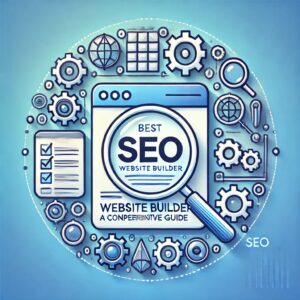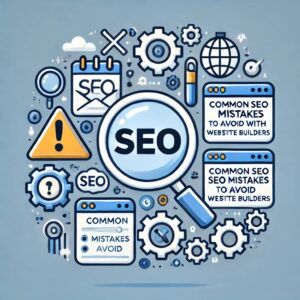
‘Best SEO Website Builder_ A Comprehensive Guide’.
Introduction
In the competitive world of online business, having a website is not enough; it needs to be easily discoverable by your target audience. This is where Search Engine Optimization (SEO) comes into play. SEO is the practice of optimizing your website to rank higher in search engine results, making it more visible to people searching for relevant information or products. A well-optimized website attracts more organic traffic, which can lead to increased conversions and growth.
This article will provide a comprehensive guide to choosing the best SEO website builder. We will explore the essential features that make a website builder SEO-friendly, compare popular options, and offer practical tips for optimizing your site. Additionally, we will discuss advanced SEO techniques, common pitfalls to avoid, and emerging trends in the field.
Selecting the right website builder is crucial for your SEO strategy. A builder with robust SEO tools can help you create a site that is both user-friendly and optimized for search engines. This choice can significantly affect your website’s performance, visibility, and ultimately, your success online. Whether you’re a beginner or looking to improve your existing site, this guide will help you navigate the options and make an informed decision. Let’s dive into the world of SEO website builders and discover how they can boost your online presence.
What is an SEO Website Builder?
When building a website, one of the most crucial aspects to consider is its ability to rank well on search engines. This is where an SEO website builder comes into play. An SEO website builder is a platform specifically designed to help users create websites that are optimized for search engines. These builders come equipped with tools and features that make it easier to implement SEO best practices, ensuring that your site is more likely to appear at the top of search engine results pages (SERPs).
Definition and Explanation of SEO Website Builders
An SEO website builder is a tool that simplifies the process of creating a website with built-in features to enhance search engine optimization. These platforms provide a range of functionalities that help you design a site that is not only attractive but also optimized to rank higher on search engines like Google. They cater to both beginners and advanced users, offering easy-to-use interfaces and advanced customization options.
Key Features That Make a Website Builder SEO-Friendly
- Mobile Responsiveness
- With the increasing number of users accessing the internet via mobile devices, having a mobile-responsive website is essential. An SEO-friendly website builder ensures that your site looks and functions well on all devices, improving user experience and search engine rankings.
- Fast Loading Times
- Page speed is a critical factor for SEO. Slow-loading websites can lead to higher bounce rates and lower rankings. SEO website builders are designed to optimize loading times, ensuring that your site loads quickly and efficiently.
- Customizable Meta Tags
- Meta tags, including title tags and meta descriptions, play a significant role in how search engines understand and rank your website. An SEO website builder allows you to easily customize these tags for each page, helping to improve your site’s visibility and click-through rates.
- Clean, SEO-Friendly Code
- The underlying code of your website can impact its SEO performance. SEO website builders generate clean, structured code that is easy for search engines to crawl and index, enhancing your site’s chances of ranking higher.
- Integrated Analytics Tools
- To effectively monitor and improve your SEO efforts, it’s important to have access to analytics. SEO website builders often come with integrated tools like Google Analytics and Search Console, providing valuable insights into your site’s performance and helping you make data-driven decisions.
Why SEO Matters for Your Website
In the digital marketing world, SEO (Search Engine Optimization) is a fundamental strategy for increasing your website’s visibility and attracting more organic traffic. SEO involves various techniques to ensure your site ranks higher in search engine results, making it easier for potential customers to find you.
Explanation of SEO and Its Role in Digital Marketing
SEO is the practice of optimizing your website to improve its ranking on search engine results pages (SERPs). It encompasses a range of activities, from keyword research and content creation to technical adjustments and link building. In digital marketing, SEO is crucial because it helps drive organic traffic to your site, which is both cost-effective and sustainable. By improving your search engine rankings, you increase your chances of being discovered by users who are actively searching for the products or services you offer.
Benefits of Having a Website Optimized for Search Engines
- Increased Visibility
- An optimized website ranks higher in search engine results, making it more likely that users will find and visit your site. Increased visibility leads to more traffic, which can translate into more leads and sales.
- Higher Search Rankings
- By implementing SEO best practices, your website can achieve higher rankings on SERPs. Higher rankings mean more exposure and a better chance of attracting your target audience.
- Improved User Experience
- SEO is not just about pleasing search engines; it’s also about providing a better experience for your users. Faster loading times, mobile responsiveness, and easy navigation are all SEO elements that enhance the user experience.
- Enhanced Credibility and Trust
- Websites that rank higher in search results are often perceived as more credible and trustworthy. SEO helps build your site’s authority and reputation, encouraging users to trust your brand and engage with your content.
Top Features to Look for in an SEO Website Builder
Choosing the right SEO website builder is essential for creating a site that is both attractive and optimized for search engines. Here are the top features you should look for in an SEO website builder:
- Built-in SEO Tools
- Essential SEO tools like customizable meta tags, alt text for images, and XML sitemaps are crucial. These tools help ensure your content is properly indexed and ranked by search engines.
- User-Friendly Interface for SEO Beginners
- A website builder should have an intuitive, easy-to-use interface that allows beginners to implement SEO best practices without needing extensive technical knowledge. This includes simple settings for meta tags, keywords, and descriptions.
- Advanced SEO Settings for Experienced Users
- For more advanced users, the builder should offer detailed SEO settings, such as custom URL structures, 301 redirects, and advanced schema markup. These features give experienced users greater control over their site’s SEO.
- Integration with Google Analytics and Search Console
- To track and analyze your site’s performance, seamless integration with Google Analytics and Google Search Console is essential. These tools provide valuable insights into your site’s traffic, user behaviour, and search performance.
- Social Media Integration
- Social signals can influence SEO, so having built-in social media integration is important. This feature allows you to easily share content and engage with your audience across different social platforms, boosting your site’s visibility.
- High-Quality Templates and Design Options
- The design of your site impacts user experience and engagement. Look for website builders that offer high-quality, customizable templates optimized for SEO. A well-designed site can reduce bounce rates and improve dwell time, positively affecting your SEO.
Comparing Popular SEO Website Builders
Selecting the right website builder with strong SEO capabilities is essential for enhancing your site’s visibility and performance. Let’s take a closer look at some of the most popular website builders known for their robust SEO features.
WordPress
WordPress is widely regarded as one of the best platforms for SEO. It offers a high degree of customization through plugins like Yoast SEO and All in One SEO Pack, which provide comprehensive tools for optimizing your site’s content, meta tags, and overall structure. WordPress also supports clean code and fast loading times, essential factors for SEO. Moreover, its flexibility allows for the implementation of advanced SEO techniques, making it a top choice for both beginners and advanced users.
Wix
Wix is another popular website builder that has made significant strides in improving its SEO capabilities. It offers an easy-to-use interface with built-in SEO tools, such as customizable meta tags, URL optimization, and automatic sitemaps. Wix also provides a step-by-step SEO Wiz tool that guides users through the process of optimizing their site. This makes it an excellent choice for those who may not have extensive technical knowledge but still want to ensure their site is SEO-friendly.
Squarespace
Squarespace is known for its beautiful design templates and user-friendly interface. It also comes equipped with solid SEO features, including clean URLs, customizable meta tags, and automatic sitemaps. Squarespace supports SSL certificates, which enhance site security and can positively impact SEO. Additionally, it offers built-in integration with Google Analytics, allowing users to track and optimize their site’s performance.
Weebly
Weebly provides a straightforward platform with essential SEO tools built in. Users can easily edit meta tags, optimize images with alt text, and create SEO-friendly URLs. Weebly also supports mobile optimization, ensuring that your site looks great and performs well on all devices. Its drag-and-drop interface makes it accessible to users of all skill levels, while still providing the necessary tools to enhance your site’s SEO.
Shopify
For eCommerce websites, Shopify is a powerful platform with strong SEO capabilities. Shopify allows users to customize title tags, meta descriptions, and alt text for images, all of which are crucial for SEO. It also provides features like SSL certification and fast loading times, which contribute to a better user experience and improved search engine rankings. Additionally, Shopify’s integration with various SEO apps and tools helps users optimize their online stores effectively.
Joomla
Joomla is a flexible and versatile content management system that offers robust SEO features. It allows users to manage meta tags, create SEO-friendly URLs, and integrate with popular SEO extensions. Joomla’s flexibility makes it suitable for more complex websites, and it supports advanced SEO techniques such as schema markup. However, it may require a bit more technical expertise compared to some of the more user-friendly builders like Wix or Weebly.
In-Depth Reviews of the Best SEO Website Builders

‘In-Depth Reviews of the Best SEO Website Builders’.
WordPress
Pros and Cons:
- Pros: Highly customizable, extensive plugin library, robust SEO features, large community support, flexible design options.
- Cons: Steeper learning curve, requires more maintenance, hosting not included.
Key SEO Features:
- Yoast SEO and All in One SEO Pack plugins for comprehensive SEO management.
- Customizable permalinks and meta tags.
- Mobile-responsive themes.
- Clean, SEO-friendly code.
- Integration with Google Analytics and other SEO tools.
Pricing:
- WordPress is free to use, but you need to pay for hosting premium themes, and plugins. Hosting costs can range from $3 to $30+ per month.
Ease of Use:
- While WordPress offers extensive customization options, it may require a bit more technical knowledge compared to other website builders. However, with a wealth of tutorials and a large community, users can find plenty of resources to help them.
User Reviews:
- Users appreciate the flexibility and powerful SEO features of WordPress. Many highlight the effectiveness of plugins like Yoast SEO in improving their site’s search engine rankings. However, some users note the platform’s complexity and the need for regular updates and maintenance.
Wix
Pros and Cons:
- Pros: User-friendly interface, drag-and-drop builder, comprehensive built-in SEO tools, regular updates and new features.
- Cons: Less flexible than WordPress, limited customization for advanced users, and some users report slower page speeds.
Key SEO Features:
- SEO Wiz tool for step-by-step optimization guidance.
- Customizable meta tags, URLs, and headers.
- Built-in sitemaps.
- Mobile optimization.
- Integration with Google Analytics and Search Console.
Pricing:
- Wix plans range from $14 to $39 per month, depending on the features and storage required. There is also a free plan with Wix ads and limited features.
Ease of Use:
- Wix is known for its intuitive drag-and-drop interface, making it an excellent choice for beginners. The SEO Wiz tool simplifies the optimization process, providing clear instructions and tips.
User Reviews:
- Users praise Wix for its ease of use and the helpfulness of the SEO Wiz tool. Many appreciate the regular updates and new features. Some users, however, mention limitations in customization and occasional slower loading times.
Squarespace
Pros and Cons:
- Pros: Elegant design templates, easy-to-use interface, solid SEO features, excellent customer support.
- Cons: Less customizable than WordPress, higher price point, limited third-party integrations.
Key SEO Features:
- Customizable meta tags and clean URLs.
- Mobile-responsive templates.
- SSL certificates for security.
- Automatic XML sitemaps.
- Integration with Google Analytics.
Pricing:
- Squarespace plans range from $12 to $40 per month. All plans include hosting, and there are no free plans, but a 14-day free trial is available.
Ease of Use:
- Squarespace offers a user-friendly interface with beautiful templates, making it easy for users to create visually appealing, SEO-friendly websites. The platform is well-suited for those who prioritize design and ease of use.
User Reviews:
- Users often highlight the sleek design options and the straightforwardness of setting up a site on Squarespace. The SEO tools are generally well-received, though some users wish for more customization options and lower pricing.
Weebly
Pros and Cons:
- Pros: Easy drag-and-drop interface, affordable pricing, solid SEO tools, and good customer support.
- Cons: Less flexibility and fewer design options compared to other builders, limited advanced SEO features.
Key SEO Features:
- Customizable meta tags and alt text.
- SEO-friendly URL structure.
- Mobile-responsive themes.
- Built-in sitemaps.
- Basic SEO guide and tips.
Pricing:
- Weebly plans range from $6 to $26 per month. There is also a free plan with Weebly branding.
Ease of Use:
- Weebly’s drag-and-drop interface makes it one of the easiest website builders to use, suitable for beginners who want to quickly create and optimize their site without extensive technical knowledge.
User Reviews:
- Users appreciate Weebly’s simplicity and affordability. The SEO features are considered sufficient for small businesses and personal sites, though more advanced users might find the options somewhat limiting.
Shopify
Pros and Cons:
- Pros: Excellent for eCommerce, comprehensive SEO features, easy-to-use interface, and many third-party integrations.
- Cons: Higher cost, transaction fees, limited flexibility outside of eCommerce.
Key SEO Features:
- Customizable title tags, meta descriptions, and URLs.
- Built-in blogging platform.
- Mobile optimization.
- Fast loading times and secure hosting.
- Integration with Google Analytics and SEO apps.
Pricing:
- Shopify plans start at $29 per month and can go up to $299 per month, depending on the features and scale of your online store. There is also a 14-day free trial available.
Ease of Use:
- Shopify’s interface is designed for ease of use, particularly for eCommerce. It simplifies the process of setting up an online store and optimizing it for search engines.
User Reviews:
- Users often commend Shopify for its robust eCommerce capabilities and effective SEO tools. The platform’s ease of use and comprehensive app store are frequently mentioned positives. However, some users find the costs higher compared to other website builders, especially when additional apps are needed.
How to Choose the Right SEO Website Builder for Your Needs
Selecting the best SEO website builder for your specific needs involves considering several key factors. Making the right choice can significantly impact your website’s performance, visibility, and success. Here are the crucial aspects to consider:
Factors to Consider When Choosing an SEO Website Builder
- Budget
- Website builders come at various price points. Evaluate your budget to determine what you can afford. Keep in mind that some platforms offer free plans with basic features, while premium plans provide more advanced SEO tools and capabilities.
- Technical Expertise
- Your level of technical skill plays a significant role in choosing a website builder. Some platforms, like Wix and Weebly, are user-friendly and require minimal technical knowledge. Others, like WordPress, offer greater flexibility but may require more technical expertise to fully utilize.
- Business Goals and Needs
- Consider what you aim to achieve with your website. Are you looking to create a blog, an eCommerce store, or a portfolio site? Different website builders cater to different types of websites. For instance, Shopify is excellent for eCommerce, while WordPress is versatile enough for blogs, portfolios, and business sites.
- Type of Website
- Identify the type of website you need. Each website builder excels in different areas. For example, Squarespace is known for its beautiful design templates, making it ideal for portfolios and visual-centric websites. On the other hand, Shopify is specifically designed for eCommerce, offering features tailored to online stores.
- Future Scalability
- Think about your long-term plans. As your business grows, you may need more advanced features or the ability to scale your website. Choose a platform that can grow with you, offering scalability and advanced SEO tools as your needs evolve.
Tips for Optimizing Your Website for SEO Using a Website Builder
Once you have selected the right SEO website builder, the next step is to optimize your site to improve its search engine ranking. Here are some practical tips to help you get started:
Practical Tips for Improving SEO on Your Website
- Conducting Keyword Research
- Keyword research is the foundation of effective SEO. Use tools like Google Keyword Planner, Ahrefs, or SEMrush to find relevant keywords for your content. Focus on keywords with high search volume and low competition to attract more organic traffic.
- Optimizing Content for Target Keywords
- Integrate your target keywords naturally into your website’s content. This includes titles, headings, meta descriptions, and body text. Avoid keyword stuffing; instead, aim for a natural flow that provides value to your readers.
- Ensuring Mobile-Friendliness
- With an increasing number of users accessing websites from mobile devices, ensuring your site is mobile-friendly is crucial. Choose a responsive design that adjusts seamlessly to different screen sizes. Google’s Mobile-Friendly Test can help you check your site’s mobile compatibility.
- Improving Site Speed
- Site speed is a critical ranking factor. Optimize images, use a content delivery network (CDN), and minimize code to improve loading times. Many website builders offer built-in tools to help enhance site speed.
- Creating High-Quality, Relevant Content
- Content is king in SEO. Regularly update your site with high-quality, relevant content that addresses the needs and interests of your audience. Blog posts, articles, and multimedia content can all contribute to better SEO.
- Building Backlinks
- Backlinks from reputable websites can significantly boost your SEO. Focus on building relationships with other sites in your niche and create shareable content that others will want to link to. Guest blogging and collaborations are effective strategies for earning backlinks.
Case Studies of Successful Websites Built with SEO Website Builders
Learning from real-world examples can provide valuable insights into how effective SEO strategies can be implemented using website builders. Here are a few case studies of websites that have successfully achieved high search engine rankings:
Example 1: Fashion Boutique – Stylish Threads
Description of the Website: Stylish Threads is an online fashion boutique that uses Shopify to manage its eCommerce platform. The site is well-organized, visually appealing, and offers a seamless shopping experience.
SEO Strategies Implemented:
- Keyword Research: Conducted extensive keyword research to identify high-volume, low-competition keywords related to fashion and apparel.
- On-Page SEO: Optimized product descriptions, titles, and meta tags with targeted keywords.
- Content Marketing: Maintained a blog with fashion tips, trends, and styling advice, integrating relevant keywords naturally.
- Backlink Building: Collaborated with fashion bloggers and influencers to generate high-quality backlinks.
Results Achieved:
- Achieved first-page rankings for several competitive keywords like “trendy fashion boutique” and “affordable stylish clothing.”
- Experienced a 200% increase in organic traffic within six months.
- Boosted sales and customer engagement through improved search visibility.
Example 2: Tech Review Blog – Gadget Guru
Description of the Website: Gadget Guru is a tech review blog built on WordPress. The site features detailed reviews, comparisons, and buying guides for the latest tech gadgets.
SEO Strategies Implemented:
- Schema Markup: Implemented schema markup for product reviews, helping search engines understand the content better and display rich snippets.
- Site Speed Optimization: Utilized caching plugins and optimized images to ensure fast loading times.
- Mobile Optimization: Ensured a responsive design that provides an excellent user experience on all devices.
- Social Media Integration: Promoted content through social media channels to drive traffic and earn backlinks.
Results Achieved:
- Secured featured snippets for key product review keywords.
- Increased organic traffic by 150% in one year.
- Enhanced user engagement and reduced bounce rates with a mobile-friendly, fast-loading site.
Example 3: Local Bakery – Sweet Treats
Description of the Website: Sweet Treats is a local bakery using Wix to showcase its products and services. The website features mouth-watering images, a blog, and an easy-to-navigate layout.
SEO Strategies Implemented:
- Local SEO: Optimized for local keywords like “best bakery in [City]” and “fresh pastries near me.”
- Google My Business Integration: Set up and optimized a Google My Business profile to enhance local search visibility.
- Customer Reviews: Encouraged satisfied customers to leave positive reviews on Google and Yelp.
- Regular Content Updates: Maintained a blog with baking tips, recipes, and news about local events.
Results Achieved:
- Dominated local search results for bakery-related keywords.
- Increased foot traffic to the bakery by 40% due to higher online visibility.
- Established a strong online reputation through customer reviews and local SEO efforts.
Advanced SEO Techniques for Website Builders
To stay ahead in the competitive online landscape, it’s essential to implement advanced SEO techniques. Here are some key strategies to consider:
Schema Markup and Structured Data
Explanation of Schema Markup: Schema markup is a form of microdata that helps search engines understand the content on your website better. It can enhance your site’s appearance in search results by enabling rich snippets.
How to Implement Structured Data Using Different Website Builders:
- WordPress: Use plugins like Yoast SEO or Schema Pro to add structured data.
- Wix: Utilize the built-in SEO Wiz tool to implement schema markup.
- Squarespace: Add custom code blocks to include schema markup on relevant pages.
Benefits of Schema Markup for SEO:
- Improves visibility in search results with enhanced listings.
- Increases click-through rates by providing more information directly in search results.
- Helps search engines understand the context of your content, leading to better indexing.
Voice Search Optimization
Importance of Optimizing for Voice Search: With the rise of smart speakers and virtual assistants, voice search is becoming increasingly important. Optimizing for voice search can help you capture this growing segment of users.
Techniques for Voice Search Optimization:
- Natural Language Keywords: Use conversational language and long-tail keywords that mimic how people speak.
- Featured Snippets: Aim to rank for featured snippets, as voice search often pulls answers from these positions.
- FAQ Sections: Include FAQ sections on your site to address common voice search queries.
Examples of How Website Builders Support Voice Search Optimization:
- Wix: Offers SEO tools that help optimize for long-tail keywords and question-based searches.
- Shopify: Provides apps and integrations that assist with optimizing product pages for voice search.
- WordPress: Utilize plugins that help structure content for voice search.
Local SEO Optimization
Importance of Local SEO for Businesses: Local SEO is crucial for businesses that rely on local customers. It helps improve visibility in local search results, driving more foot traffic and local leads.
Features in Website Builders That Support Local SEO:
- Google My Business Integration: Ensure your website builder allows easy integration with Google My Business.
- Local Keywords: Optimize your site with location-specific keywords.
- NAP Consistency: Ensure your Name, Address, and Phone number are consistent across all online listings.
Tips for Optimizing a Website for Local Search:
- Create Local Content: Publish blog posts and articles relevant to local events and news.
- Encourage Reviews: Ask satisfied customers to leave positive reviews on Google and other review sites.
- Optimize for Mobile: Ensure your site is mobile-friendly, as many local searches are conducted on mobile devices.
Common SEO Mistakes to Avoid with Website Builders

‘Common SEO Mistakes to Avoid with Website Builders’.
Even with the best website builders, certain common SEO mistakes can hinder your site’s performance. Avoiding these pitfalls is essential for maximizing your site’s visibility and effectiveness.
Overlooking Mobile Optimization
Importance of Mobile-Friendly Websites: With the majority of internet users accessing websites via mobile devices, having a mobile-friendly site is crucial. Google also prioritizes mobile-first indexing, meaning the mobile version of your site is considered the primary version.
How to Ensure Mobile Optimization Using Different Website Builders:
- WordPress: Use responsive themes and plugins like WPtouch to enhance mobile optimization.
- Wix: Automatically create a mobile-friendly version of your site; use the Mobile Editor to tweak it further.
- Squarespace: All templates are mobile-responsive; customize mobile styles within the style editor.
Ignoring Image Optimization
Benefits of Optimizing Images for SEO: Optimized images improve site speed, user experience, and search engine rankings. Properly tagged images can also appear in image search results, driving additional traffic.
Techniques for Image Optimization:
- Alt Text: Add descriptive alt text to help search engines understand the content of your images.
- File Size Reduction: Compress images to reduce load times without sacrificing quality.
- File Names: Use descriptive, keyword-rich file names for your images.
Tools and Features in Website Builders for Image Optimization:
- WordPress: Plugins like Smush and EWWW Image Optimizer automatically compress and optimize images.
- Wix: Built-in image optimization tools and automatic compression.
- Squarespace: Automatically optimizes images and provides options to add alt text.
Neglecting Regular Content Updates
Importance of Fresh and Updated Content for SEO: Search engines favour websites that regularly update their content. Fresh content keeps your audience engaged and improves your chances of ranking higher.
Strategies for Maintaining Regular Content Updates:
- Content Calendar: Plan and schedule regular updates and blog posts.
- User-Generated Content: Encourage reviews and comments to keep content dynamic.
- Repurpose Content: Update and republish older posts with new information.
How Website Builders Facilitate Content Management:
- WordPress: User-friendly CMS with scheduling and editorial tools.
- Wix: Blog and content management tools that allow easy updates.
- Squarespace: Built-in blogging platform with scheduling features.
Integrating Third-Party SEO Tools with Website Builders
To enhance your SEO efforts, integrating third-party SEO tools with your website builder can provide advanced insights and capabilities.
Popular Third-Party SEO Tools
- SEMrush: Comprehensive tool for keyword research, site audits, and competitive analysis.
- Ahrefs: Excellent for backlink analysis, keyword research, and content ideas.
- Moz: Provides tools for keyword tracking, site audits, and link building.
Benefits of Using Third-Party SEO Tools Alongside Website Builders:
- Detailed Analytics: Gain deeper insights into your site’s performance and areas for improvement.
- Competitive Analysis: Understand how your competitors are performing and find opportunities to outrank them.
- Advanced SEO Features: Access advanced features like backlink analysis, keyword tracking, and site audits.
How to Integrate SEO Tools
Step-by-Step Guide for Integrating SEO Tools with Different Website Builders:
- WordPress:
- SEMrush: Install the SEMrush SEO Writing Assistant plugin.
- Ahrefs: Use the Ahrefs WordPress plugin to monitor your site.
- Moz: Install the Moz Pro plugin for on-page optimization.
- Wix:
- SEMrush: Use the SEMrush integration available in the Wix App Market.
- Ahrefs: Manually integrate using Ahrefs Site Audit and other tools.
- Moz: Utilize Wix’s SEO tools and integrate them with Moz’s web-based tools.
- Squarespace:
- SEMrush: Utilize SEMrush reports and manually apply insights.
- Ahrefs: Use Ahrefs’ external tools for site audits and link analysis.
- Moz: Manually integrate insights from Moz tools into Squarespace’s SEO settings.
Examples and Screenshots of Integration Processes:
- Provide visual guides and screenshots demonstrating the integration steps for each tool and platform.
Maximizing the Benefits of SEO Tools
Tips for Effectively Using Third-Party SEO Tools:
- Regular Monitoring: Frequently check your site’s performance metrics and make necessary adjustments.
- Competitor Analysis: Regularly analyze competitor sites to stay ahead in the rankings.
- Content Optimization: Use insights from these tools to refine and improve your content strategy.
Case Studies or Examples of Successful Integration:
- Share stories of websites that improved their SEO rankings by effectively using third-party tools alongside their website builders.
- Include before-and-after metrics to highlight the impact of these integrations.
HFuture Trends in SEO for Website Builders
As technology evolves, so do SEO strategies and tools. Staying ahead of these trends can give you a competitive edge. Here are some future trends in SEO for website builders to watch out for:
AI and Machine Learning in SEO
Impact of AI and Machine Learning on SEO Practices: AI and machine learning are revolutionizing the way search engines rank websites. These technologies help search engines better understand user intent, deliver more relevant search results, and improve the accuracy of ranking algorithms.
How Website Builders Are Incorporating AI and Machine Learning:
- WordPress: Plugins like RankMath and Yoast SEO are incorporating AI to provide smarter SEO recommendations.
- Wix: Wix’s SEO Wiz uses AI to offer personalized SEO plans and insights.
- Squarespace: Utilizes AI to enhance content suggestions and optimize SEO settings automatically.
Rise of Visual and Video Search
Importance of Visual and Video Content for SEO: Visual and video content is becoming increasingly important for SEO. Search engines are now capable of indexing and ranking visual content, making it crucial for websites to optimize images and videos to improve their search visibility.
Tools and Features in Website Builders to Optimize Visual and Video Content:
- WordPress: Plugins like Smush for image optimization and Video SEO for video content.
- Wix: Built-in tools for video optimization and image alt text editing.
- Squarespace: Automatic image compression and video blocks that are optimized for SEO.
Progressive Web Apps (PWAs)
Explanation of PWAs and Their SEO Benefits: Progressive Web Apps (PWAs) combine the best features of web and mobile apps, offering fast loading times, offline access, and improved user experiences. PWAs can enhance SEO by reducing bounce rates and increasing user engagement.
How Website Builders Support the Creation of PWAs:
- WordPress: PWA plugins like Super Progressive Web Apps make it easy to turn a WordPress site into a PWA.
- Wix: Offers features to create mobile-friendly PWAs directly from the dashboard.
- Squarespace: Provides templates and customization options that support PWA capabilities.
Frequently Asked Questions (FAQs) About SEO Website Builders
Common Questions and Expert Answers
Q1: What is the best website builder for SEO?
- A: The best website builder for SEO depends on your specific needs. WordPress is highly recommended for its flexibility and powerful SEO plugins. Wix and Squarespace are excellent choices for beginners due to their user-friendly interfaces and built-in SEO tools.
Q2: Can I optimize my website for SEO without technical knowledge?
- A: Yes, many website builders like Wix and Squarespace offer user-friendly SEO tools and guides that allow users to optimize their sites without needing technical expertise.
Q3: How important is mobile optimization for SEO?
- A: Mobile optimization is crucial for SEO as search engines prioritize mobile-first indexing. Ensuring your website is mobile-friendly can significantly impact your search rankings.
Q4: What are some common SEO mistakes to avoid?
- A: Common SEO mistakes include neglecting mobile optimization, ignoring image optimization, and failing to update content regularly. Ensuring your site is well-optimized in these areas is essential for maintaining good SEO health.
Q5: How do I integrate third-party SEO tools with my website builder?
- A: Integration processes vary depending on the website builder and the SEO tool. Generally, you can use plugins, extensions, or direct integrations to connect tools like SEMrush, Ahrefs, and Moz with your website.
Additional Resources and Reading
- Further Reading on SEO:
- Moz Beginner’s Guide to SEO
- Google’s SEO Starter Guide
- Ahrefs Blog on SEO
- Tutorials and Resources:
- WordPress SEO: Yoast SEO Tutorials, RankMath Knowledge Base
- Wix SEO: Wix SEO Guide, Wix Blog on SEO
- Squarespace SEO: Squarespace SEO Checklist, Squarespace Blog on SEO
Conclusion
Choosing the right SEO website builder is a critical step in establishing a successful online presence. As we’ve explored throughout this guide, a well-optimized website builder can significantly enhance your site’s visibility, improve search engine rankings, and drive more organic traffic. Whether you’re a beginner looking for an easy-to-use platform or an advanced user seeking extensive customization options, there is a website builder out there that can meet your specific needs.
By considering factors such as budget, technical expertise, business goals, and future scalability, you can make an informed decision that will set your website up for long-term success. Tools like WordPress, Wix, Squarespace, Weebly, and Shopify each offer unique strengths and features that cater to different types of websites and user requirements.
To maximize the SEO potential of your chosen website builder, remember to implement best practices such as conducting thorough keyword research, optimizing content and images, ensuring mobile-friendliness, improving site speed, and regularly updating your content. Leveraging advanced techniques like schema markup, voice search optimization, and local SEO can further enhance your site’s performance and keep you ahead of the competition.
As SEO continues to evolve, staying informed about future trends such as AI and machine learning, visual and video search, and Progressive Web Apps (PWAs) will be essential. Integrating third-party SEO tools and avoiding common mistakes will also help you maintain and improve your site’s SEO over time.
Now is the time to take action. Select the website builder that best suits your needs and start optimizing your site for better search engine performance. By investing in the right tools and strategies, you can achieve greater visibility, attract more visitors, and ultimately, grow your online presence. Stay proactive, keep learning, and continuously refine your SEO efforts to ensure ongoing success in the ever-changing digital landscape.










